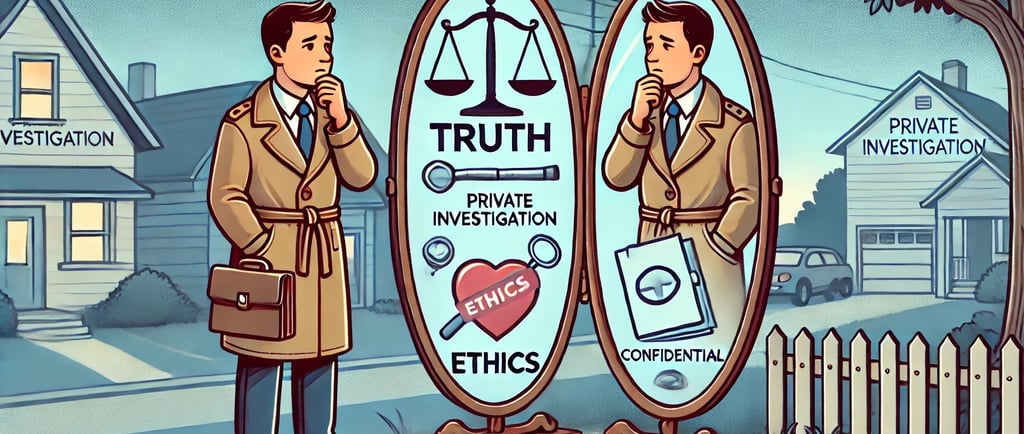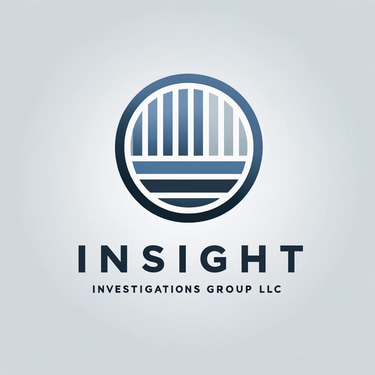Navigating the Ethical Maze: The Moral Dilemmas of Private Investigations
Explore the ethical challenges and responsibilities in private investigation through real case studies. Discover how Insight Investigative Group in Sarasota upholds integrity and balances client needs with ethical boundaries, offering compassionate, accountable investigative services.


In the shadowy corridors of private investigation, every case isn't just about uncovering truths but grappling with the ethical implications of those truths. Consider a scenario in Sarasota, where a client, John, repeatedly hires you to find his father, whom he believes might still be alive despite official records stating otherwise. This case isn't merely about investigation; it's a poignant exploration of ethics, where the boundaries between professional duty and psychological care blur.
The Foundation of Ethics in Private Investigation
Private investigators operate within a legal framework but are also governed by an ethical code that often transcends the law. Here’s why ethics are paramount:
Professional Integrity: Upholding trust with clients and the public.
Legal Boundaries: Knowing when to stop, even if something is legally permissible.
Moral Responsibility: Understanding the impact of findings on individuals' lives.
A Case Study in Ethical Conflict: The Unresolved Grief
Background:
John approached our Sarasota-based agency not just with questions but with a deep-seated need for resolution about his father's supposed death. Over several months, each lead he provided led nowhere, yet his persistence suggested more than just a quest for truth.
Ethical Dilemma:
Client's Mental Health: The evident denial or unresolved grief John displayed posed an ethical question: Should we continue an investigation that increasingly seemed therapeutic rather than fact-finding?
Professional Boundaries: How do we differentiate between our role as investigators and potential caregivers?
Ethical Decision-Making:
Intervention: We suggested John seek psychological counseling alongside our services, acknowledging his emotional state might require more than investigation.
Scope Limitation: We proposed a new contract focusing on periodic updates rather than exhaustive searches, easing the investigative intensity.
Outcome:
John initially resisted therapy but eventually recognized the emotional basis of his pursuit. We maintained a limited investigative role, committing to support him beyond the chase for physical evidence.
The Ethical vs. Legal Debate
In private investigation, what's legal isn't always ethical, and vice versa. Considerations include:
Surveillance: While often legal, excessive surveillance might infringe on privacy rights. Ethical PIs might limit surveillance to necessary times, respecting privacy where possible.
Client Confidentiality: Even if information could benefit a client, revealing it might breach trust from another perspective.
Handling Sensitive Information: How information on health, sexuality, or mental health is handled, even when legally obtained, demands ethical consideration.
Professional Standards and Ethical Codes
Most PI organizations provide ethical guidelines:
American Society for Industrial Security (ASIS) International: Sets standards for ethical practices in security and investigation.
National Association of Legal Investigators (NALI): Focuses on discretion, integrity, and legal adherence.
Our firm follows these and extends beyond by:
Regular ethical reviews of cases in team discussions.
Implementing strict policies on data handling and client confidentiality.
Offering clients choices on how ethically complex findings should be handled.
Public Perception and Ethical Practice
Media often glorifies the pursuit of truth over ethical considerations. However, real-world operations require balancing public trust with investigative necessities.
Building Trust: By demonstrating ethical behavior, PIs not only build trust but contribute to a positive public image of the profession, crucial for client acquisition and retention.
The Ethical Conundrum of the Digital Era
The digital footprint of individuals has exponentially increased available information, yet this comes with ethical challenges:
Data Privacy: How much of someone's online activity should be used? The ethical line might be drawn before the legal one.
Misinformation: PIs must be cautious about the integrity of digital information, avoiding the spread of misinformation.
Conclusion: Ethical Choices Define Us
Every investigation presents ethical crossroads. The decisions made define not only the immediate case outcome but the character of the investigator and agency.
Choosing the Path: Ethical decisions in private investigation are not about perfection but about striving for the best outcome, balancing legal duties, client expectations, and moral considerations.
Call to Action: To all current and prospective clients, understand that when you hire us, you're not just hiring for results but for a thoughtful, ethical approach to uncovering the truth. We invite discussions on your needs and how we might ethically navigate your situation.
This exploration into ethics isn't just academic; it's the heartbeat of responsible private investigation. By choosing to engage thoughtfully with these dilemmas, we serve our clients better and uphold our profession's integrity in a world increasingly demanding ethical accountability.


